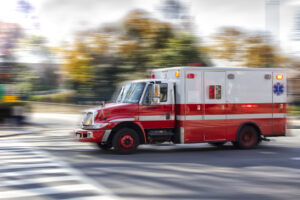
There’s no questioning whether you should seek medical care after being involved in an accident, but many people believe they don’t need to be transported to the hospital by ambulance. They might think their injuries simply aren’t that severe, for instance, or they might just want to avoid an ambulance bill.
As for deciding for or against an ambulance ride, here’s a closer look at some of the finer details to consider.
Will EMS Tell You if You Need to Take an Ambulance?

Following a car or truck accident, you should call 911 to ask for police and emergency medical personnel. The responding officer should prepare an accident report, while EMS personnel should assess everyone on the scene and transport those with severe injuries to the hospital.
Here’s how the process usually works:
- EMS will make an initial assessment of your injuries
- If your injuries are severe enough, they will recommend taking an ambulance
- If you are conscious and alert, you may refuse transport
- If you don’t feel comfortable driving yourself to the hospital, EMS will transport you
Keep in mind that EMS personnel don’t have a financial incentive to tell you to take an ambulance; their recommendations are generally made with your best interests in mind.
Signs That Taking an Ambulance Might Be a Good Idea
Determining the severity of your injuries right after an accident can be difficult. Still, EMS personnel should be able to tell you whether they suggest taking an ambulance.
Nevertheless, if you notice any of the following symptoms, you might want to consider asking to ride in the ambulance regardless:
- Nausea
- Abdominal pain, swelling, or bruising (as these are common signs of internal bleeding)
- Blurry vision
- Dizziness or confusion
- A headache
- Possible broken bones
- Tingling or numbness
- Major bleeding
The bottom line is that you should always err on the side of caution; even serious injuries may show little or no symptoms at first.
What About Cost?
While it’s true that your health should be the top priority, it’s understandable to want to avoid paying hundreds of dollars (or more) when you don’t need to.
If you didn’t cause the accident, you don’t need to worry about the cost of the bill. If you work with an attorney to file a personal injury claim, you should be able to recover compensation for expenses like the ambulance bill, as well as other costs, like your overall medical bills and lost income.
If an uninsured driver hit you, recovering compensation may be more difficult, but an attorney may be able to help you file a claim with your un/underinsured driver insurance, sue the at-fault driver directly, or do both.
Should You Seek Medical Care if You Don’t Take an Ambulance?
Even if you choose not to take an ambulance to the hospital after an accident, you should still seek immediate medical care at a hospital, urgent care center, or at your primary doctor’s office.
There are two key reasons to do so. First, a medical professional can identify non-obvious injuries before they get worse. EMS personnel can give you a general assessment, but they don’t have access to all the diagnostic tools a doctor has.
Second, waiting several days to seek medical attention can impact your personal injury claim if you choose to file one. If you decide to forgo immediate medical care, the opposing party might argue that your injuries were not severe or that they happened after the accident.
Contact the Manassas Car Accident Lawyers at The Parrish Car Accident & Personal Injury Law Firm for Help Today
Ultimately, the decision to take an ambulance is up to you. Still, even if you aren’t sure if you need one, it’s better to be cautious. Your life, health, and safety matter far more than a medical bill.
If you’ve been injured in a car accident, The Parrish Car Accident & Personal Injury Law Firm is here to help. Our Manassas car accident attorneys have the experience and skills to get you the compensation you deserve. Contact us today at (571) 229-1800 for a free consultation.


